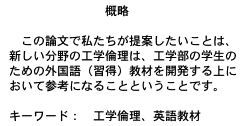|
Abstract
Over the last thirty years, considerable progress has been made in developing curricula that teaches engineering students the structures and vocabulary of
scientific English. However, the need for engineers to consider the ethical aspects of their work merits more attention. While engineering is primarily a
technical field, increasing concerns about the need to teach engineering students to consider the overall consequences of their work has emerged both from
within and outside the engineering profession. Establishing engineering ethics as a part of the content base for English courses at the university level helps both to alleviate the long-term effects of the absence of such content in traditional engineering programs and at the same time provides meaningful content for language instruction.
Keywords: engineering ethics, scientific English, ESP, applied ethics, materials development
|
